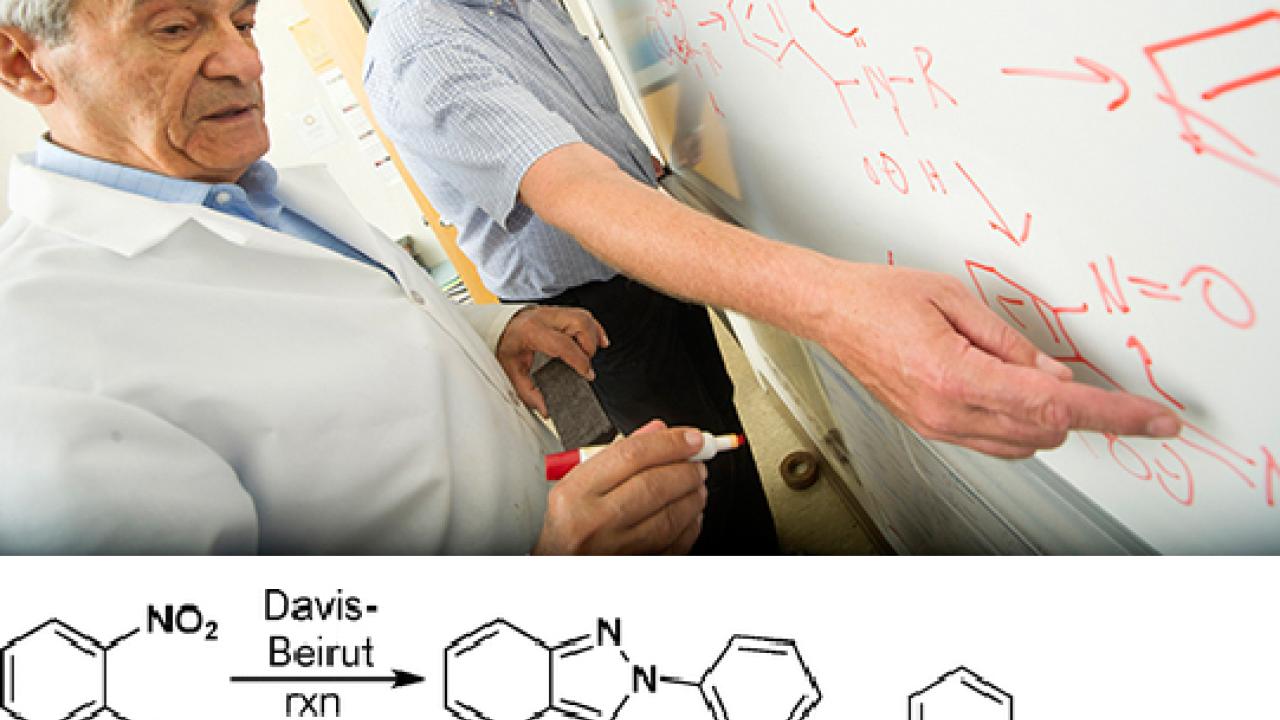Davis and Beirut have good chemistry — and a pair of scientists, UC Davis and the Davis City Council could not be more pleased.
This week they celebrated the “Davis-Beirut Reaction,” discovered by Professors Mark Kurth and Makhluf Haddadin, the former of UC Davis, the latter of the American University of Beirut, who, instead of attaching their names to the chemical reaction, chose to name it after the cities of Davis and Beirut.
In their own words: Professors Kurth and Haddadin.
The reaction, with an endproduct that has considerable potential for medicinal applications, nicely underscores the merits of international collaboration, said Kurth, who joined the Department of Chemistry in 1981.
He added that the “Davis-Beirut” name has matured in the chemistry literature, and “to the best of our knowledge it’s the first and only organic reaction named for two cities.”
Tuesday night (Aug. 27), the City Council congratulated and thanked the scientists by way of a proclamation (approved 5-0), acknowledging “with gratitude the honor and recognition bestowed on the entire Davis community.”
Kurth and Haddadin thanked the council and praised the city.
“What better place to do chemistry than Davis, California?” Kurth asked. “And that allows me to thank the people of Davis for providing such a wonderful town to live in and raise a family and to do chemistry in.”
Haddidin first came to UC Davis in September 1999 for a yearlong sabbatical, and, he said, “I’ve been coming to this hospitable city of Davis” almost every summer since.
Mayor Joe Krovoza said: “The idea that the city of Davis along with the university could have played a role in hosting the scientists for a duration that produced such a great reaction is our great honor.
“So we look forward to creating a wonderful environment for decades to come in the city of Davis exactly for the reasons that we’re here celebrating with the reaction.”
Like winning a Nobel Prize
Kurth and Haddidin have published a dozen papers in all on this chemistry, starting in 2005. In the first six, the reaction had no name.
Then, in the seventh paper, the researchers proposed the “Davis-Beirut” name “in recognition of the merits of international collaboration.” The reviewers accepted the text for publication in the American Chemical Society’s Organic Letters (Dec. 22, 2010) and thereby accepted the reaction’s name — which would appear in the title of their eighth paper, published May 25, 2011.
To have a “name reaction” is like winning a Nobel Prize, said Professor Susan Kauzlarich, chair of the Department of Chemistry. Such a name typically lasts for the rest of time, she said by email, so “it continually reminds people of who (or where, in this case) the discovery occurred.”
Kauzlarich added that she appreciates the city’s proclamation: “It is especially noteworthy to transcend science and have recognition in the broader community.”
Mayor Joe Krovoza introduced the resolution by saying: “Some people were a little bit concerned when they saw the title of the email that we might be headed for something a little bit different here,” referring to the subject line “Davis-Beirut Reaction” on a message about the proclamation.
“But rest assured it is a laudable scientific procedure that we’re going to recognize and shows the tie between town and gown and something that’s going to have a lot of velocity in the scientific literature because of its nature.”
Kurth noted his fondness for saying, “Better living through chemistry.” Then he added his hope that, not too far in the future, people will say, “Better chemistry through the Davis-Beirut Reaction.”
Media Resources
Dave Jones, Dateline, 530-752-6556, dljones@ucdavis.edu
